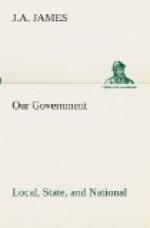The County Board.—It is evident that there must be a legislative body which shall determine the policy of the county in these matters. This is the county board, or as it is called in some States, the county court. In most States this body is composed of commissioners. These are elected by either of two methods: (1) at large, when every voter may vote for the entire number of commissioners; (2) they may be elected from districts into which the county has been divided. In some States the members of the county board are called supervisors, and they represent the towns, villages, and wards of cities. Under this system the county board is generally larger than under the commissioner system. There is another difference between the two systems: in the States that have county commissioners, the county government has a larger number of functions than in the other States. That is, the county government has almost entire control of such matters as roads and poor relief, leaving the local governments with little authority in these directions. On the other hand, where the supervisor system exists, the towns and villages have chief authority in legislating upon these matters, and the county assists or takes only such part as it finds necessary for the general good.
Power of the Board.—The county board holds annual meetings and makes laws for the county as a whole. It has charge of the county property, including the court-house, jail, and poorhouse. Since it must provide for the expense of maintaining these buildings, for the salaries of county officers, and for other expenses connected with roads, poor, and other county business, the board must also have the power of levying taxes.
Superintendent of Schools.—Education is another function of government which is not managed solely by the local units. There is a county officer, called the superintendent of schools, who has supervisory powers, and he usually examines teachers and certifies to their qualifications.
Register of Deeds.—The register of deeds, or recorder, is a county officer who keeps records of certain kinds. Among other things, copies of deeds are registered or kept in his office. A person wishing to buy real estate (i.e., houses or lands) may, by consulting the records in this office, learn whether the owner has a clear title to the property.
Coroner.—The coroner has the duty of holding inquests when persons meet death by violence or in some unexplained way. He may also perform the duties of the sheriff when the latter cannot perform them.
Surveyor.—The county surveyor makes surveys at the request of public authorities, as well as for individuals. He keeps the official records of the boundaries of farms and lots.
Clerk and Treasurer.—Of course the county must have its clerk and treasurer, the officers whose duties are to keep the records and to handle county moneys.




